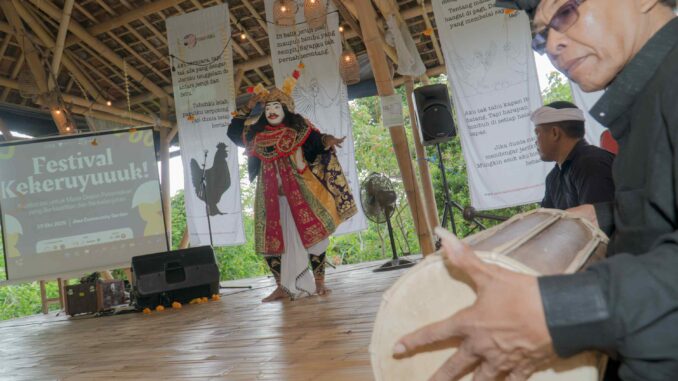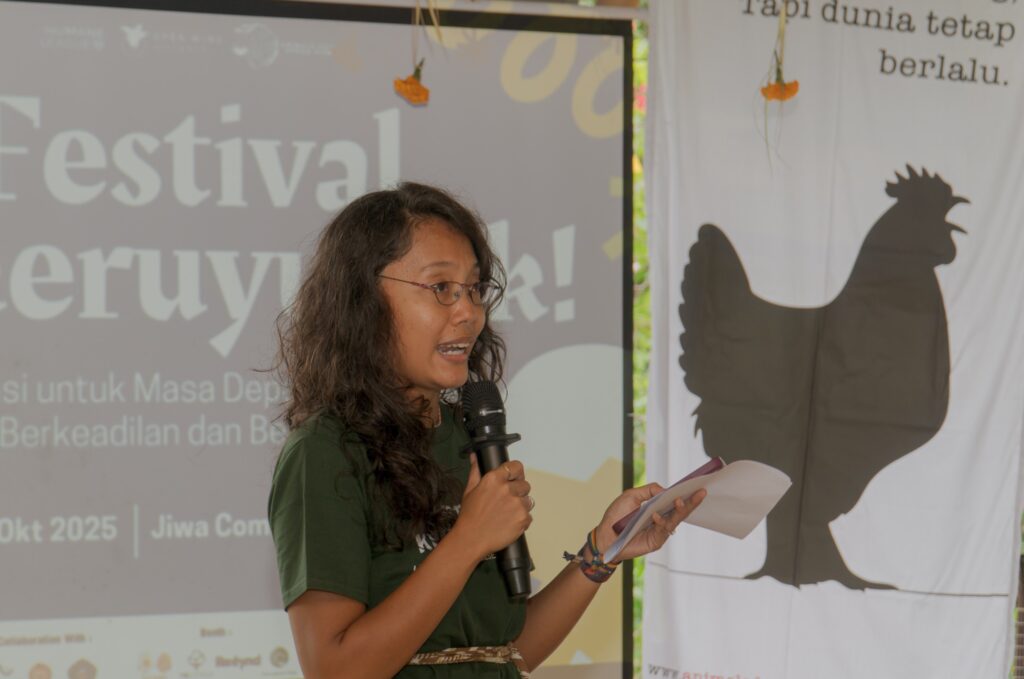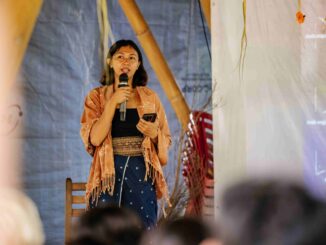
On Sunday, October 19, 2025, the Kekeruyuuuk! Festival was held by Animals Don’t Speak Human at Jiwa Garden, Badung.
The event featured a variety of activities including two panel discussions, cultural performances, children’s activities, and a lontar writing workshop.
One of the festival’s main focuses was to highlight the issue of animal protection especially laying hens within the broader context of ecological sustainability and a more compassionate farming system.
Visitors had the opportunity to learn first-hand, through the panel discussions, about the conditions of egg-laying hens kept in battery cages not merely as commodities, but as living beings playing a vital role in household food ecosystems.
An installation featuring stuffed hens crowded in a replica of a battery cage attracted significant attention, especially from those unfamiliar with such confinement systems.
Visitors were also invited to engage with facilitators in discussions on more empathetic and compassionate ways to raise poultry.
Two panel discussions
The festival presented two panel discussions that explored sustainability from two different perspectives.
These discussions addressed the potential and challenges faced by businesses in adopting practices that prioritize not only profit but also animal welfare, environmental sustainability, and social well-being.
Several speakers shared their experiences building locally rooted enterprises that support ecological and community regeneration.
“Today and in the future, there is growing concern around food quality and traceable production, how animals are raised, for example, is increasingly important. Consumers are becoming more attentive to where their food comes from,” explained Prof. Dr. Ir. Ali Agus, who currently serves as Special Advisor to the Minister of Agriculture.

Another panel explored how tourism practices in Bali and surrounding areas can shift toward more sustainable models.
Speakers discussed the importance of involving local communities, reducing environmental impact, and creating travel experiences that do not harm natural ecosystems.
“Cage-free systems offer added value, particularly in terms of sustainable sourcing that supports both animal welfare and long-term sustainability,” said Hasanul Adha Fauzi, Marketing Manager of MANA Ubud.
Beyond the panel discussions, the festival also featured traditional Balinese dance, acoustic music, and a lontar writing workshop.
For children, there was a kids’ corner with nature- and environment-themed activities designed to promote play and learning.
The core highlight of the festival was its compassionate approach to animal life and its connection to food systems.
Animals Don’t Speak Human, as the organizing body, presented laying hens not as exotic displays or decorative props, but as integral to a meaningful conversation about sustainability and ecological justice.
In informal sessions, visitors were invited to reflect on the human-animal relationship in farming: Have we treated them fairly? Is our food production system truly ethical?
As the organizer, Animals Don’t Speak Human emphasized that this festival is part of their ongoing effort to create more open and empathetic conversations around animal welfare.
Fiolita Berandhini, founder of Animals Don’t Speak Human, stated that “Through the Kekeruyuuuk! Festival, we want to raise awareness and help the public become more informed and critical as consumers, and in turn, encourage businesses to offer animal-friendly egg options.”
Kekeruyuuuk! Festival has opened the door for broader and deeper conversations around holistic sustainability. A sustainability that includes not only humans but also animals.
About Animals Don’t Speak Human
Animals Don’t Speak Human (ADSH) is a registered NGO under the name Yayasan Perlindungan Hukum Satwa Indonesia, based in Tabanan, Bali.
The organization integrates legal, scientific, and global partnership approaches to holistically address animal protection issues.
Through technology, interdisciplinary research, and policy advocacy, ADSH works to drive systemic change and end speciesism for lasting impact. (mybalinews/RLS)





Be the first to comment